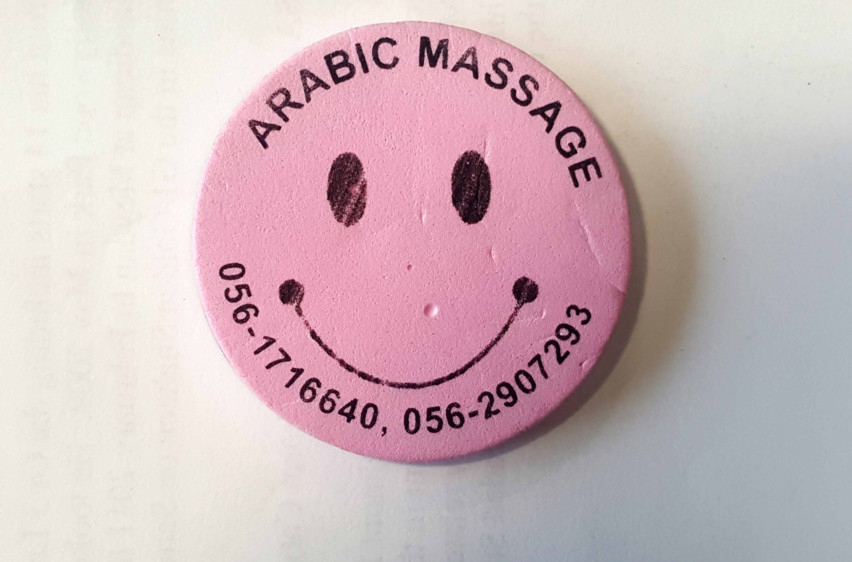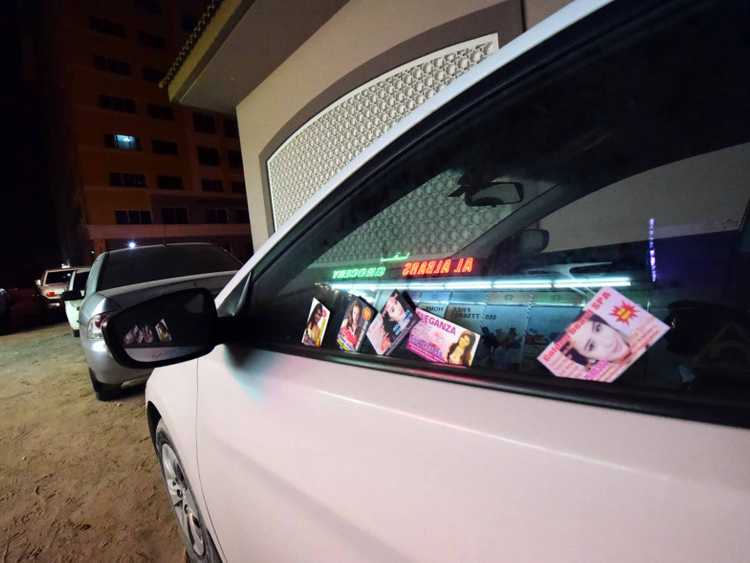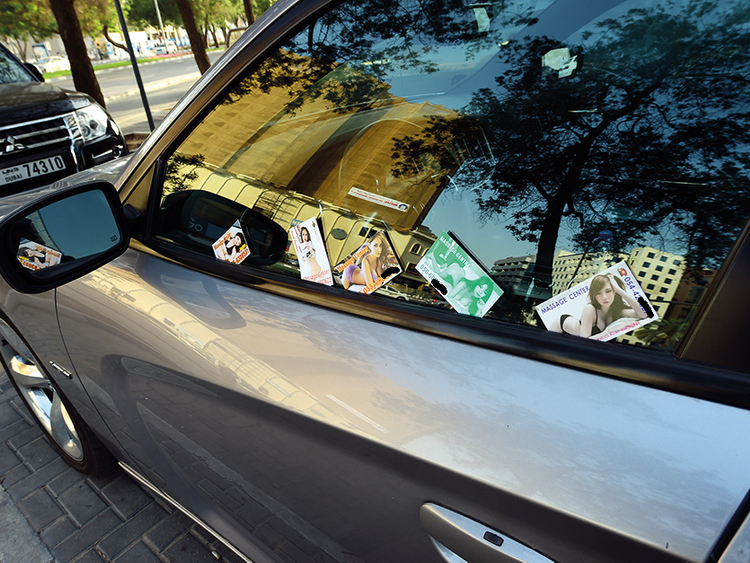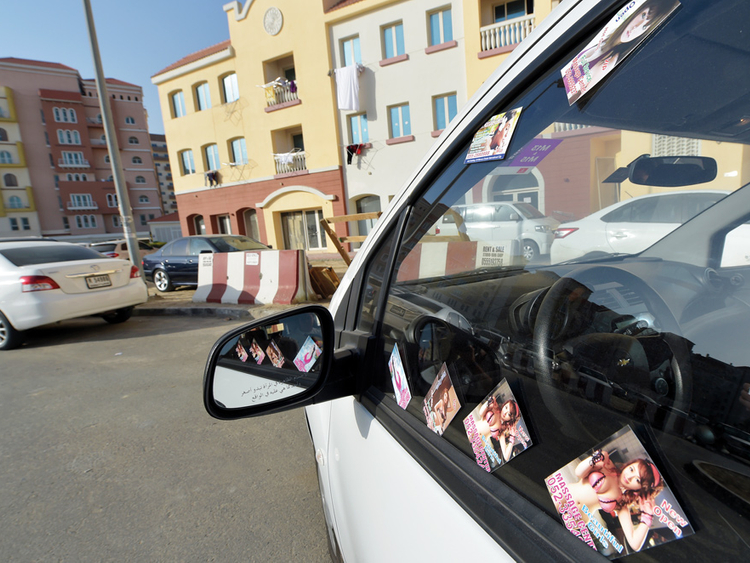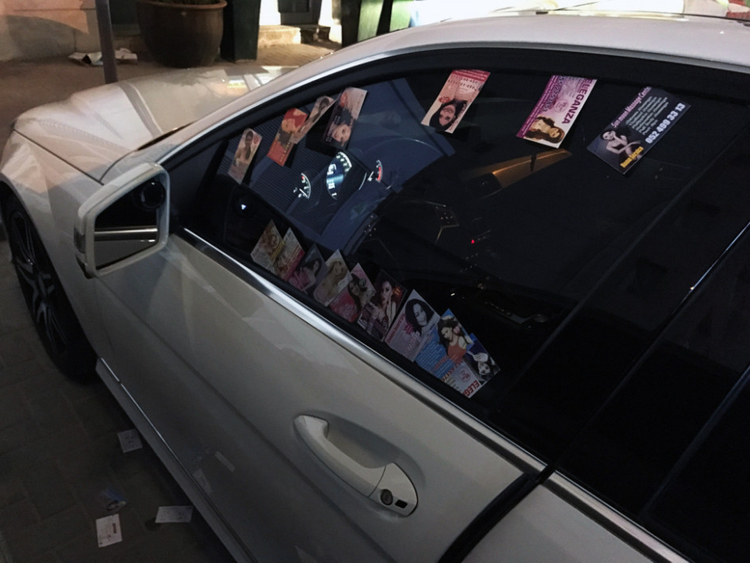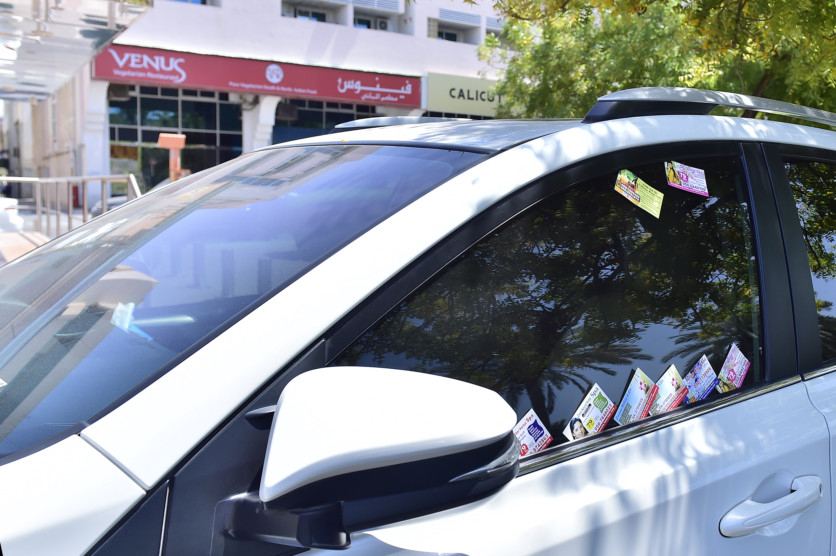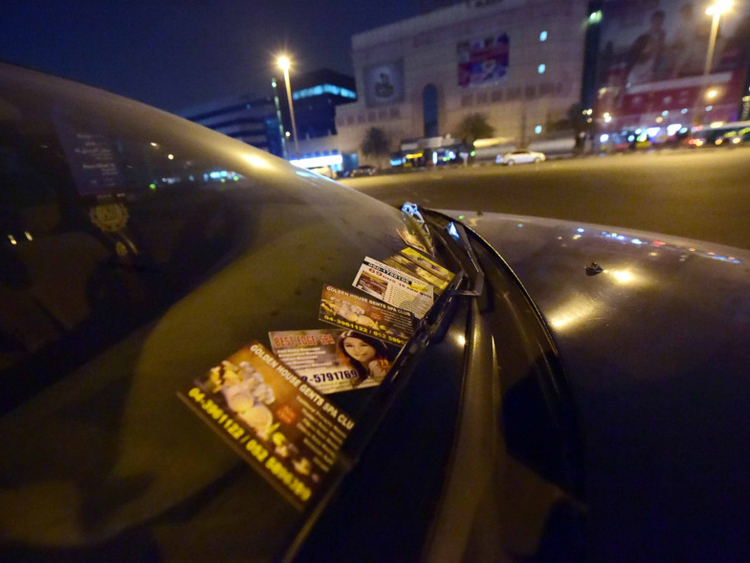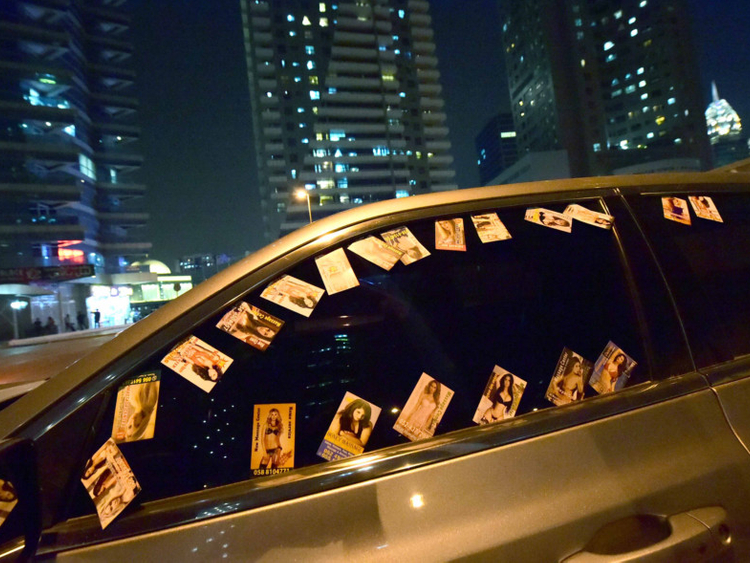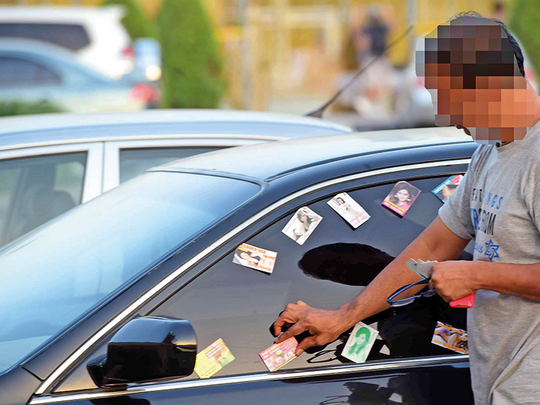
Dubai: Despite a municipality crackdown, there’s no resolution in sight for Dubai residents who face a daily barrage of cards offering unwanted massage services placed on their cars.
It’s a familiar scene for almost anybody who owns a car in Dubai.
You park on a street somewhere around the city, and come back to find cards offering dubious massage services from scantily-clad women, just a phone call away.
Most motorists find that massage card distribution tends to be focused on a few different areas.
A drive in search of massage cards around Barsha Heights — formerly known as Tecom — a district that used to be notorious for them, proved fruitless. But a nearby trip to the streets behind Mall of the Emirates in Barsha proved to be a gold mine for the cards — much to the misery of people there.
Sticky situation
“Everywhere in Barsha we see [them] massage cards,” complained a Pakistani driver who waited for customers beside his shiny limousine.
In a nearby tower, a security guard has found keeping his bosses’ cars free from massage cards is taking up plenty of his time.
To steer clear of trouble from the top, he talks to the massage card distributors on a daily basis.
“I just tell them, don’t put these cards here. Put them on the other side of the road,” said the Nepalese guard, who gave his name as Bijay.
He’s also had to turn away neighbourhood pleasure-seekers who try to tap into his knowledge of the area.
“Some put [the cards] in their pockets,” said the guard.
“During the weekends, sometimes Arab men come and ask me, where [can they find] massage parlours?”
Out on the streets, Hossam, an office-worker who hails from Canada, surveys the scene. Close to every car parked on the street in front of him has a patchwork of pink and red massage cards slipped on the driver’s window.
“If it was a normal leaflet, one would say, it’s just a marketing tool. This is not about a leaflet. This is a card with a half-naked woman on it. So what is it telling you?”
“Sometimes, you know, you might forget one card, a card you didn’t see on the other side of the car, and your wife or your girlfriend walks in and you need to explain.”
While on his morning coffee-and-cigarette break, he’s taken to scanning the streets to spot the massage card distributors.
“They’re everywhere,” he says, casting a beady eye towards a dark green German car festooned with more than a dozen cards.
Caught in the act
“Look at him!” he then says raising his voice. Across the street, an young man who appeared to be of African descent was seen furtively slipping cards on each car. His pockets bulged.
When confronted, the massage card distributor had few words to say. “I’m new to this country, so I don’t really know much about this business,” the man said. He flashed a smile and quickly walked off, while still slipping massage cards into car windows.
Litter problem
Over on the next street, two hotel workers on their cigarette break weighed in.
“Why is it bothering us? Because in the car, when you draw down the shutters down on the car, the cards get stuck down there,” said Shehan, a Sri Lankan expat.
Future mechanical issues aside, his colleague Adel, who hails from Pakistan, voiced concerns over the content of the cards — and how many people just throw them on the ground.
“When my children see the naked pics, I feel very embarrassed. I don’t throw down the cards. Because if I throw it down, I’m opening up an opportunity for a child to see it,” said Adel.
He has since taken to putting the cards in a bucket, and throwing them away later.
Once, Adel left his car parked on a street for a couple of days. When he came back, he counted close to 75 massage cards plastered all over his small hatchback.
“It was full, from one end to the other side,” he said.
Once, the two workers claim that they saw a massage card ‘distribution manager’ — in this case an Asian-looking lady — check that the cards were being put on cars.
“She was going around checking how many cards had been put there. I was shocked,” said Adel.
Even the spiritual are not safe from the scourge of the often-unwanted cards — and their contents.
“We got out of church, after the morning there, and then we came to our car,” said Susha Abraham, an Indian expat who attends a church in Oud Metha with her husband. “There are usually cards put on our car, but this time, I was shocked to find that it was not just a massage card. It said, 15 new girls, for Dh69 [for a massage]. I hope the authorities are going to do something about it in order to curb this menace.”
What are massage cards?
To the uninitiated, a massage card is a small advert for a massage parlour or ‘health spa’ usually placed in a car window or slipped under a car door.
Massage cards — all standard business card-sized, vary slightly in format. Nearly all portray scantily-clad women. There’s sometimes a price mentioned, often under Dh100, and mobile phone numbers listed.
Many advertise masseuses of different nationalities — commonly Moroccan, Russian, Egyptian, Thai, Filipino, Chinese, and “African.”
In an unusual twist, a card for one parlour placed on the window of a car in Al Barsha carries the logos of Visa and Mastercard.
Handy payment options aside, some cards also have a location map for the parlour printed on the back. Others just advertise “24/7 hotel and home service.”
Some residents report that massage cards are also changing form.
In some areas of Dubai, people are finding the standard thick matte paper cards replaced by circular magnets. One massage magnet seen by Gulf News showed a smiley face and two mobile numbers under the words: “Arabic Massage.”
Finding a printer willing to produce the cards is a simple process — and cheap.
Using a different email address, Gulf News asked five different Dubai-based firms via email to give a price for printing full-colour cards. To leave no doubt of the card’s contents, a sample stock pic of a bikini-clad model was attached.
One firm replied almost immediately, with the sales manager quoting a price of Dh170 for 1,200 cards, just 14 fils per card.
Dubai authorities strike back
A recent crackdown led to the seizure of more than seven million massage cards that were to be placed on car windows.
In coordination with police, the Dubai Municipality carried out the campaign in several areas in Dubai, the government body told Gulf News.
In the districts of Al Nahda, Al Qusais, Al Rigga, Abu Hail, and Hor Al Anz, authorities issued 57 fines against massage centres which were “illegally” distributing their advertising cards on car windows.
The placement of massage cards on car windows “annoys the public and defaces the aesthetic appearance of the city,” said Abdul Majeed Saifaie, Dubai Municipality’s director of Waste Management, in a statement.
The team managed to bust some of the distributors who are “usually wanted or violators of the residency law.”
To maintain the cleanliness of the city, residents who find massage cards on their car windows should dispose of them in a bin, instead of throwing them on the street, the municipality said.


